What is Phở?
Phở (pronounced “feuh”) is a Vietnamese noodle soup that is often made with beef and deliciously garnished with fresh bean sprouts, basil and chillies. It’s THE classic of Vietnamese cuisine.
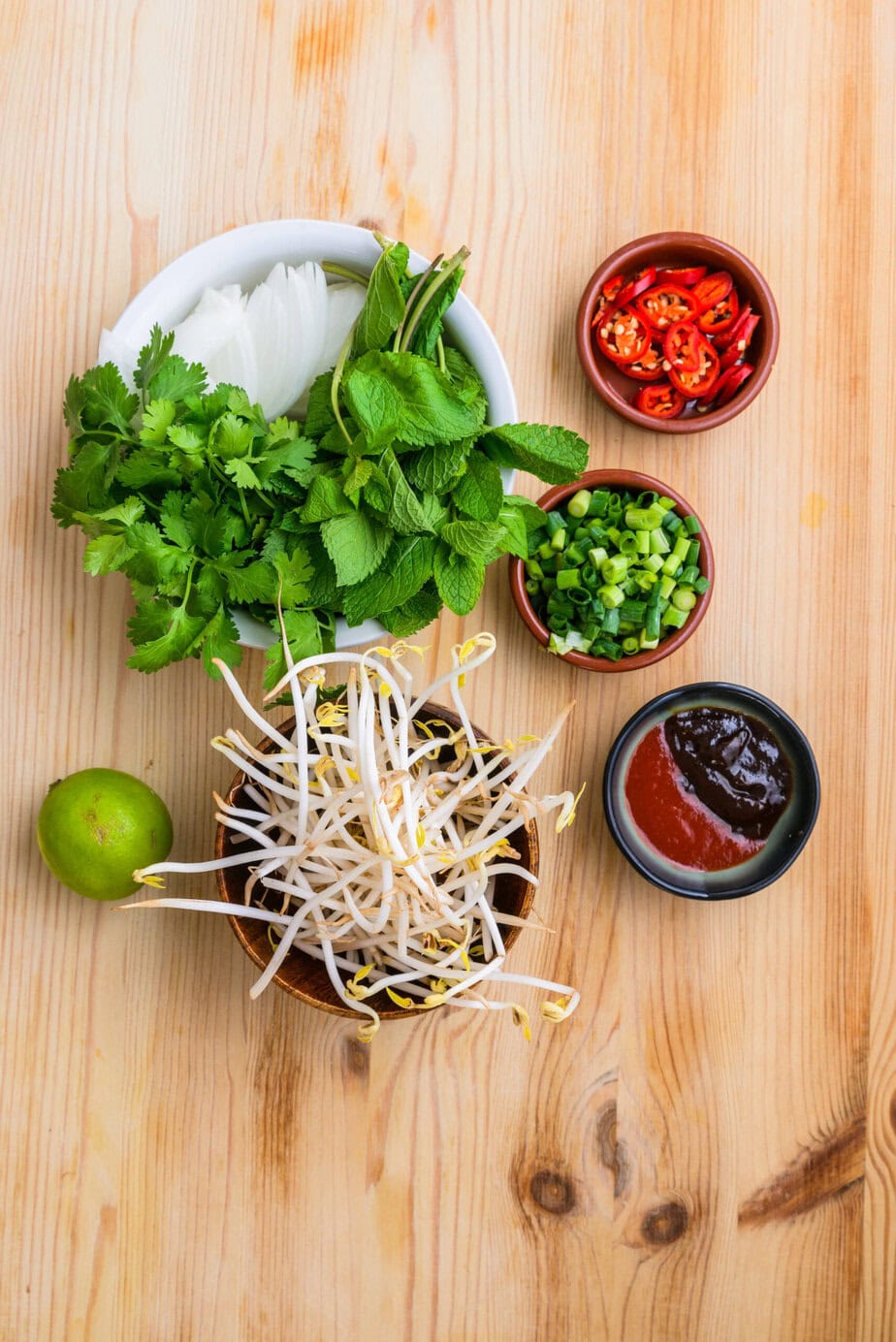
I’m absolutely passionate about this extraordinary soup, characterized by its intensely fragrant broth, offering a veritable explosion of flavors. The slightly chewy rice noodles add a delicious texture to the dish, while the aromatic garnishes enhance and complement the overall flavors.
For a successful meal, serve banh cam for dessert
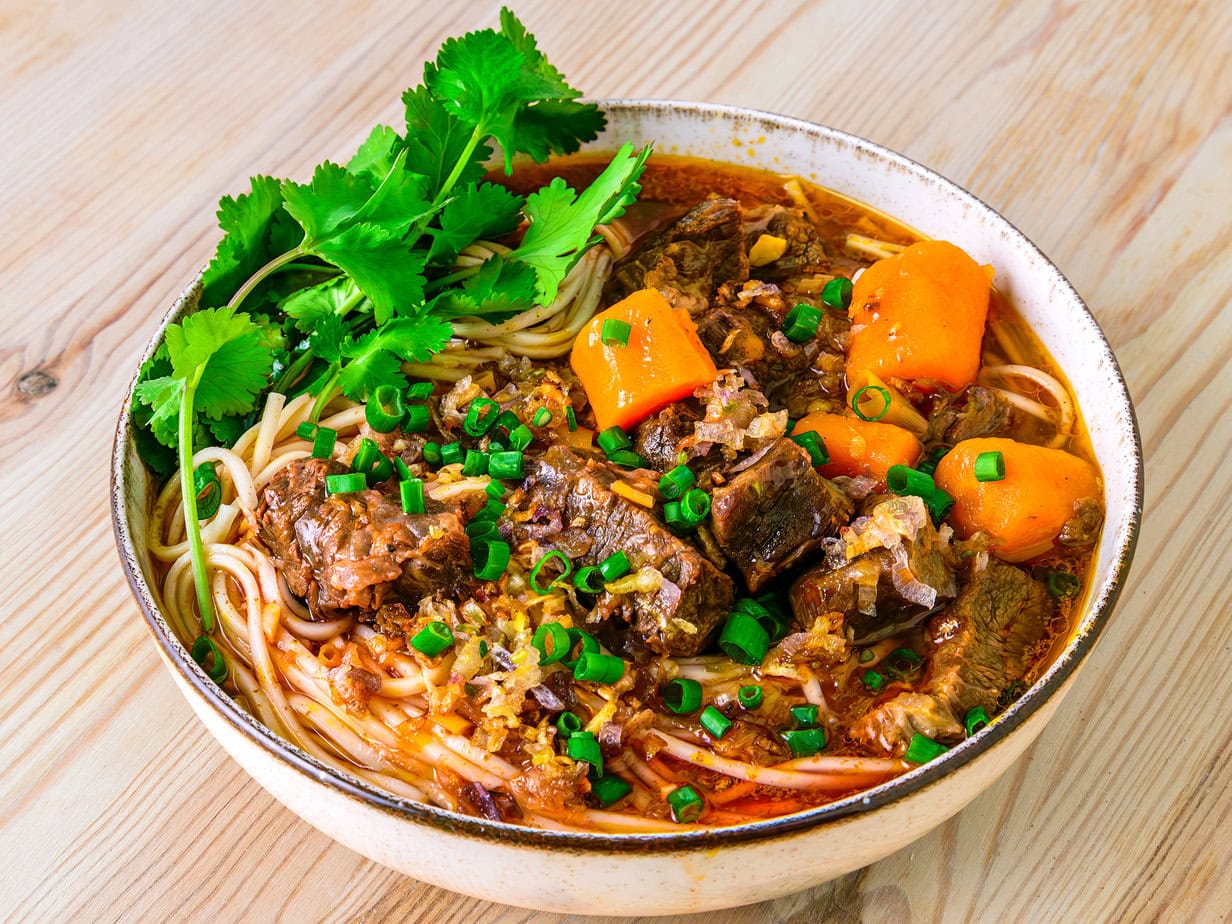
The broth: an essential part of the dish
The superiority of a delicious bowl of Phở depends largely on the complexity and gustatory intensity of its broth, which is the key element of this tasty Vietnamese soup.
As far as the noodles are concerned, there are no secret tricks you need to know. Pho’s special feature is that the beef is usually added raw to the mixture, allowing the heat of the broth to cook it slightly and preserve its tenderness.
For vegetable and herb garnishes, they are also added in their raw state to preserve their freshness and flavor. So, to perfect and enhance the taste of a Phở, it’s essential to focus on the meticulous preparation of the broth, for therein lies the secret of an unforgettable culinary experience.
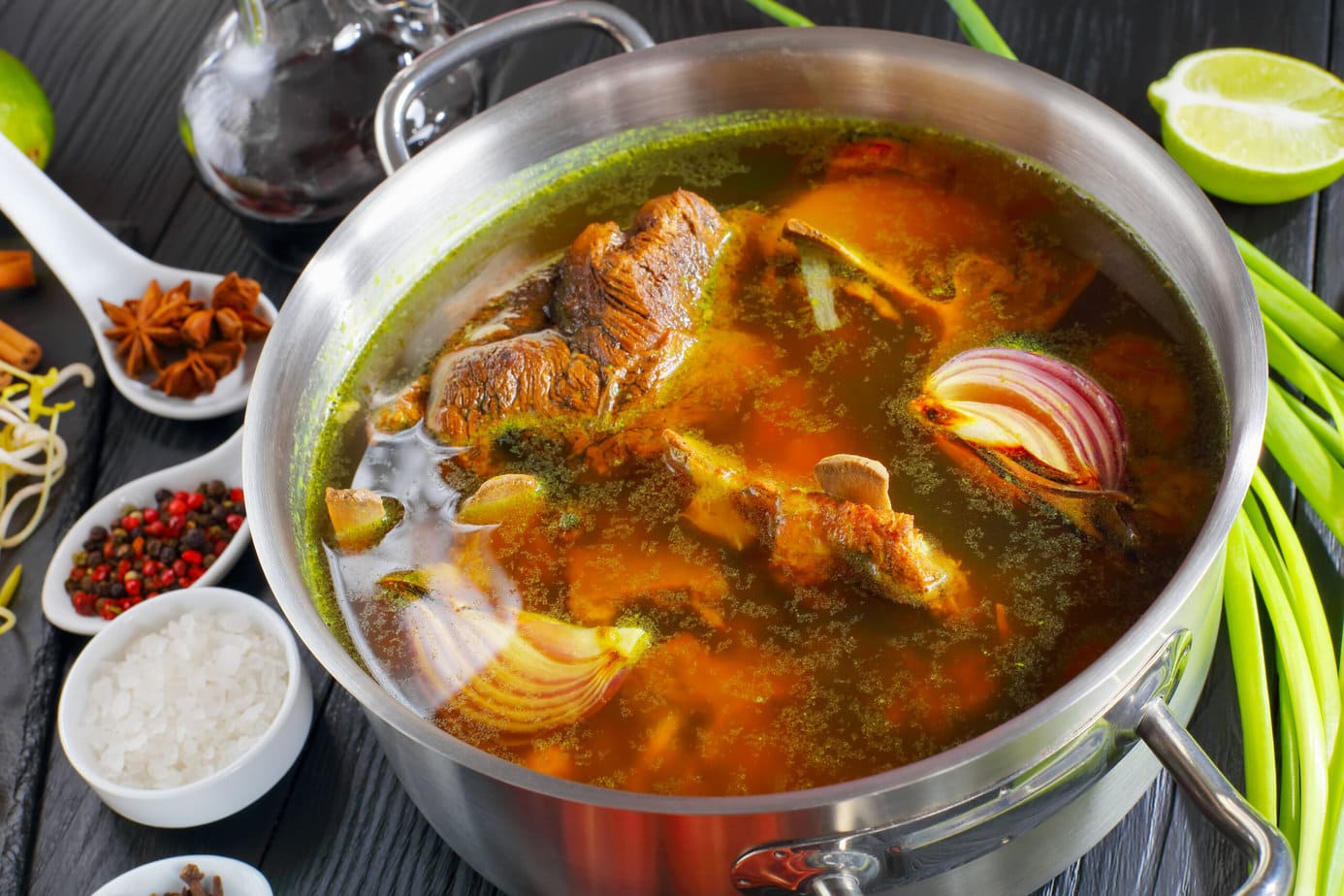
In a nutshell? No broth, no Phở.
The use of MSG in the broth is not essential, and is very controversial. Personally, I use it, but you can easily do without it.
Making a tasty broth requires a certain investment of time; however, once you’ve carefully started preparing it, simply leave it to simmer for the flavors to develop and intensify.
During this period of slow cooking, the ingredients gradually release their aromas, creating a rich, fragrant base for the dish. Once this crucial stage has been completed, all that remains is to assemble the various elements to create the final dish, sure to delight the taste buds of your guests.
Key steps for making a delicious phô broth
Here are the 4 key steps to preparing a tasty and authentic pho broth:
Pre-boiling the bones : This first step involves briefly boiling the bones to remove impurities and ensure a clear, clean broth.
Grilling onions, garlic and ginger: Lightly grilling ginger, garlic and onions reveals and intensifies their flavors. These ingredients add a unique depth and fragrance to the broth.
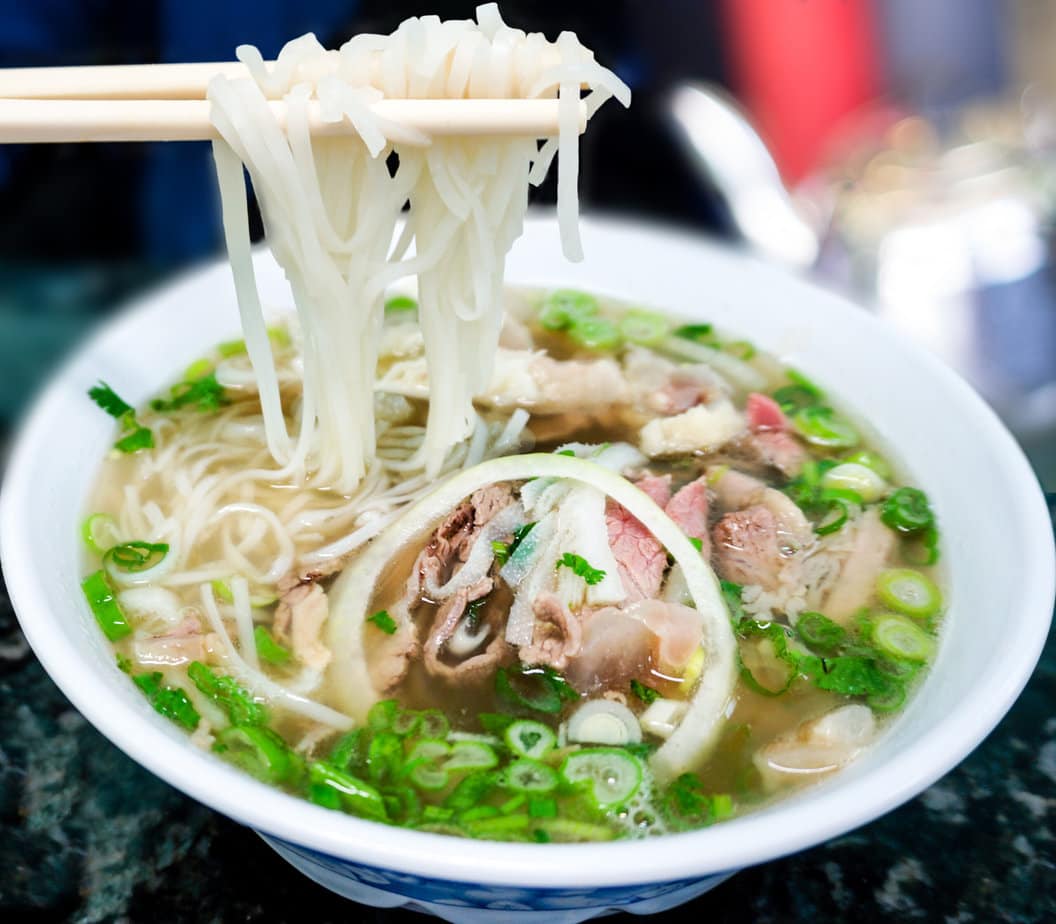
Roasting spices: Lightly toasting spices such as cloves, coriander seeds and star anise releases their aromas and creates a rich, complex base for the broth.
If you want the perfect broth, the process is divided into two main stages: first prepare the broth, then make the soup. The result is an ultra-concentrated broth, which can be eaten as is if you like, but is usually diluted to make soup.
Incorporating fish sauce: Adding fish sauce in place of salt enhances the flavors of the broth, while adding that umami touch characteristic of Vietnamese cuisine.
The main ingredients of Phở
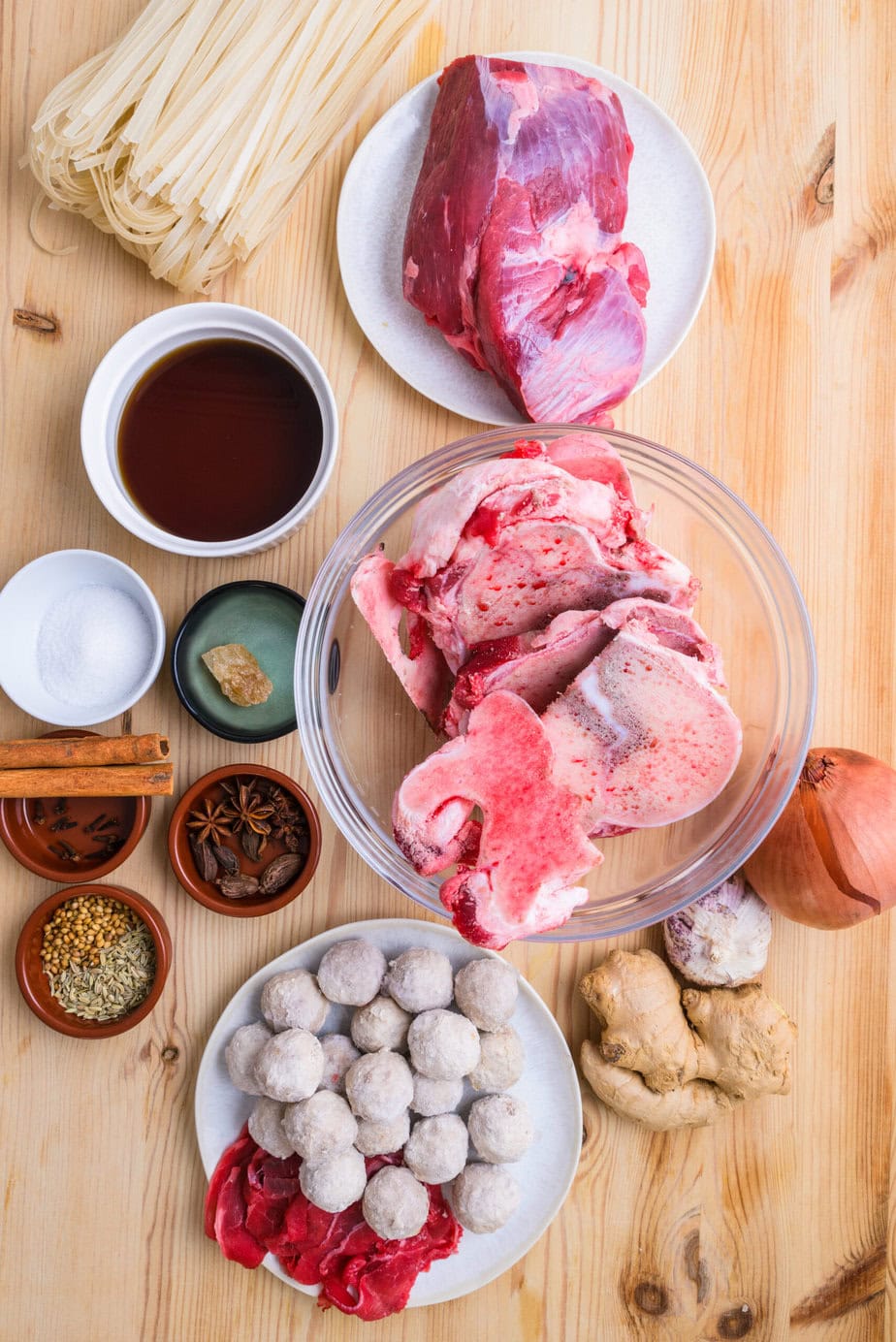
Beef in all its forms: on the bone, in carpaccio or in a block: it can be found at every level of the recipe and infuses its flavours everywhere.
Cinnamon: here, it’s best to use Chinese cinnamon or cassia cinnamon.
Fish sauce: I recommend squid or Phu Quoc, which are the benchmarks for fish sauce without being too expensive.
Star anise: Adds a lovely aniseed flavour to the broth, without overpowering the other ingredients.
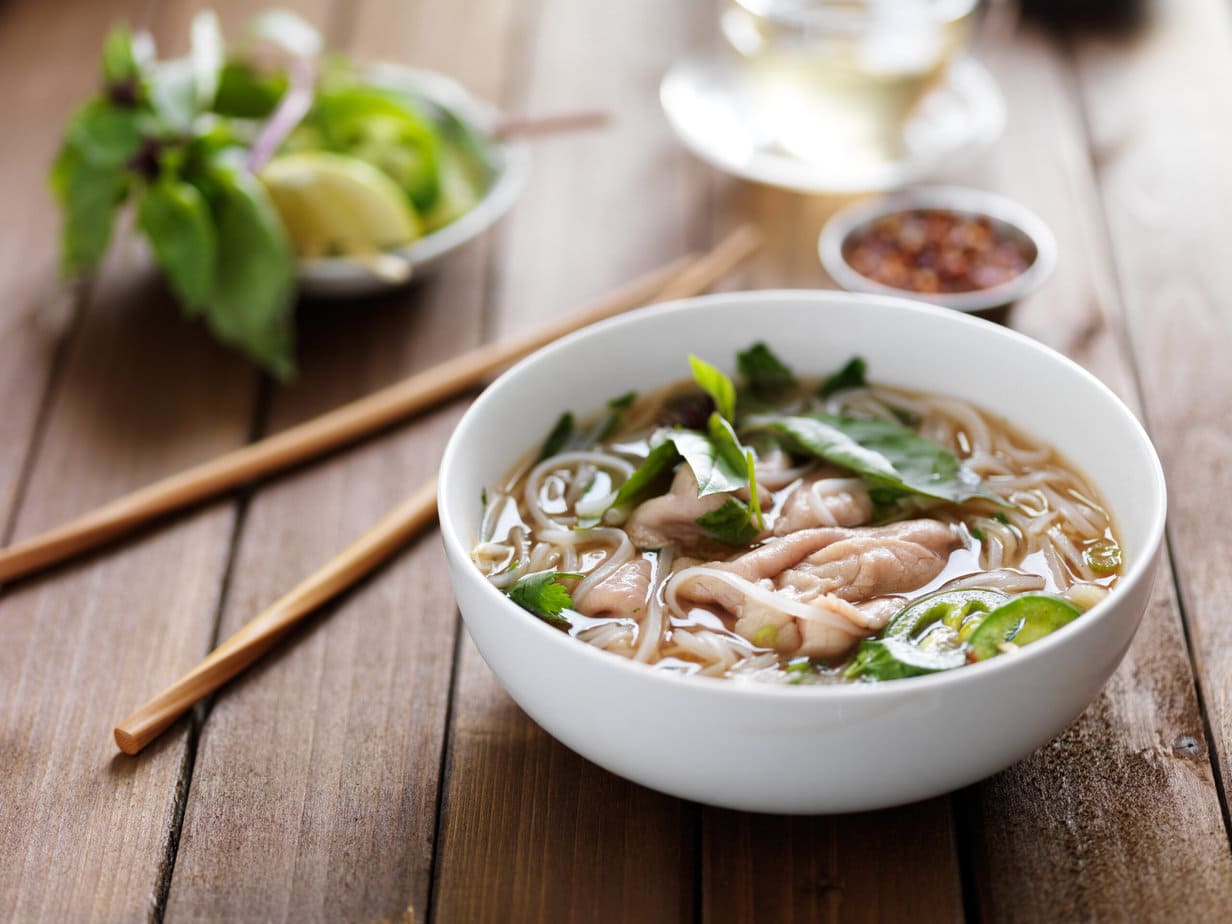
Palm sugar or rock sugar Rock sugar is traditionally used, and this is what is used in the recipe. But if necessary, use palm sugar.
Tip: use “coconut sugar” or “coconut blossom sugar”, sold in jars. It’s the same product, but in a form that dissolves much more easily than lump palm sugar. If necessary, replace with brown sugar.
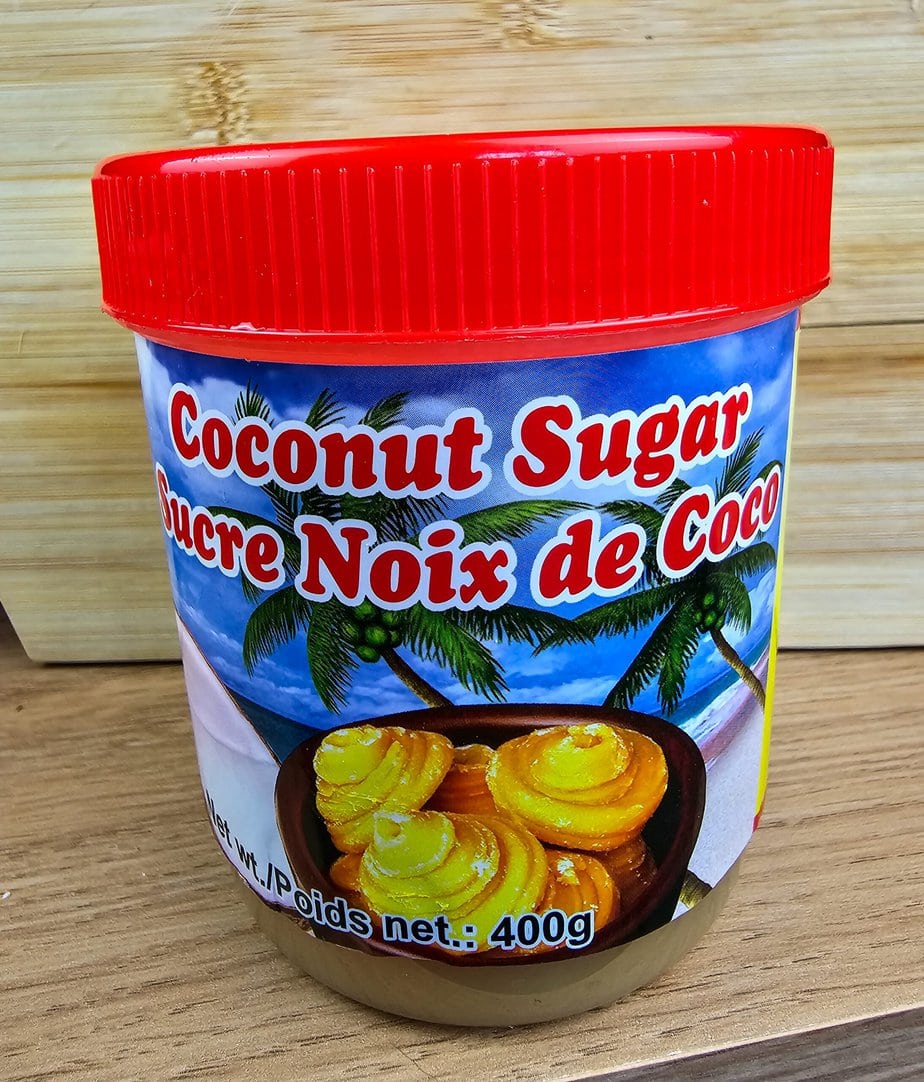
Rice noodles: Traditional noodles, you can use Phô special noodles, vermicelli noodles or any size in between. No one will judge you (but the larger the better, hehe).
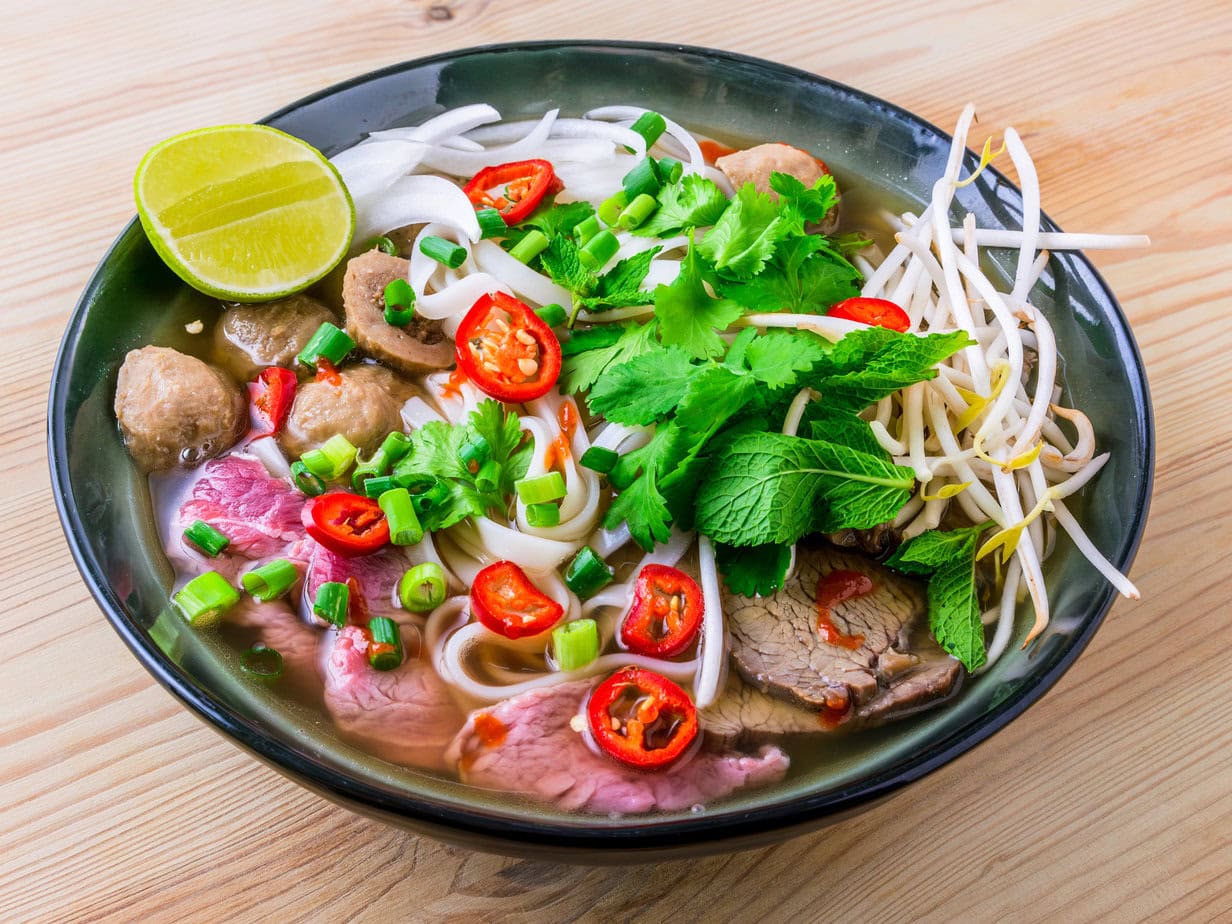
Authentic Vietnamese Phở
Ingredients
- 450 g rice noodles ideally labelled as noodles for Phở
Bouillon
- 1.5 kg big beef bones approximately
- 1 kg of brisket or other slow-cooked piece, well marbled in a single large piece
- 1 lump of rock sugar approx. 5 cm
- 230 ml of fish sauce
- 3 tablespoons salt
Grilling herbs
- 1 onion
- 1 large piece of ginger the equivalent of a fist in volume
- 1 head of garlic
Spices for cheesecloth
- 2 cinnamon sticks ideally Chinese cinnamon (cassia)
- 1 tablespoon coriander seeds
- 1 tablespoon fennel seeds
- 5 star anise
- 5 pods black cardamom Chinese cardamom
- 10 cloves
Trim
- 0.5 onion
- 1 package mung bean sprouts
- 1 package young onions
- 1 package cilantro
- Peppers
- Lime
- Sriracha sauce
- Hoisin sauce
- Mint optional
- Thai basil optional
Optional
- 1 package of beef balls with tendon meat bò vò viên, found in Asian supermarkets
- 500 g steak sliced carpaccio style
Instructions
Initial preparation
- In a large saucepan, blanch the marrow bones over high heat for 10 minutes.1.5 kg big beef bones
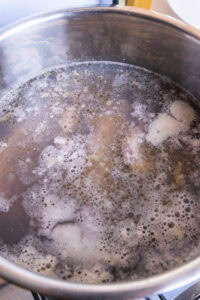
- Meanwhile, cut the onion in 2, slice the ginger lengthwise in several slices and slice the whole head of garlic in 2, leaving the skin on.1 onion, 1 large piece of ginger, 1 head of garlic
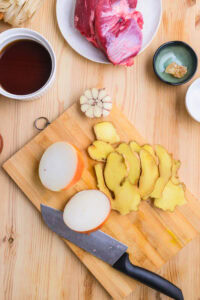
- Preheat the oven to maximum temperature in grill mode (heat from the top). Put what you sliced earlier on aluminum foil and a cake, and bake until slightly blackened (about 15min). Be careful not to char them either, but there should still be a layer of “black”.
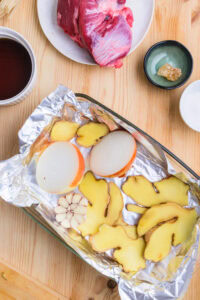
- Pour the blanched bones into a colander. Clean the pan
- Place all your spices in the cheesecloth.2 cinnamon sticks, 1 tablespoon coriander seeds, 1 tablespoon fennel seeds, 5 star anise, 5 pods black cardamom, 10 cloves
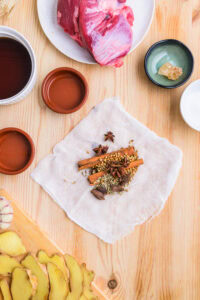
Cooking the broth
- In a large saucepan, place the sachet of spices, the large piece of beef, the herbs grilled earlier, the fish sauce, the sugar, the salt, the bones…1 kg of brisket, 1 lump of rock sugar, 3 tablespoons salt, 230 ml of fish sauce
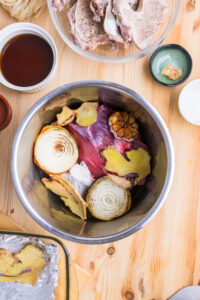
- Fill to the brim with water, after adding the remaining ingredients.
- Bring to the boil, uncovered, then place over medium-low or even low heat and simmer for 3 hours, stirring occasionally.
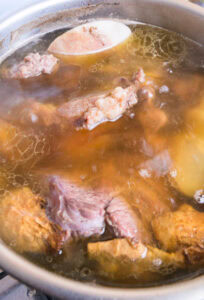
- After 20-30min, remove the large piece of beef. Let it rest for a while, then put it in the freezer for 30 minutes.
- Then slice it as thinly as possible
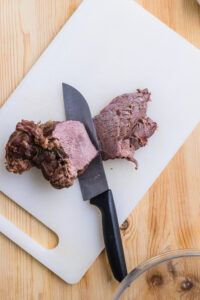
- At the same time (after 30 min of cooking), add the meatballs to the broth if applicable.1 package of beef balls with tendon meat
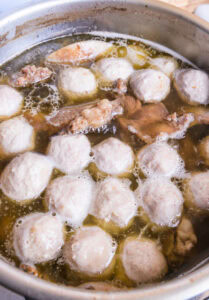
Finishing the broth
- After 3 hours, filter the broth through a very fine metal strainer. If you taste it at this stage, it will be far too concentrated/rich/salty.
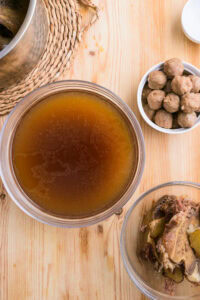
- Collect the dumplings, place in an airtight container and store in the fridge. Onion confit is delicious eaten straight from the tin if you’re feeling hungry after all that cooking.
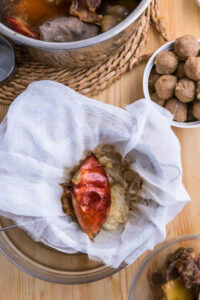
- Let the broth sit for a few hours (covered) before storing in the fridge overnight.
- The next day, when the fat has solidified on top, remove about 80% of it with a spoon. Leave a little for flavor. Keep the rest for stir-frying – it’s delicious!
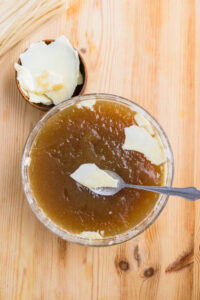
Just before serving
- Start by heating all the stock and tasting. If it’s too strong, remove 1 liter, put it in the fridge for another time and replace it with 1 liter of water. Repeat as many times as necessary, tasting.
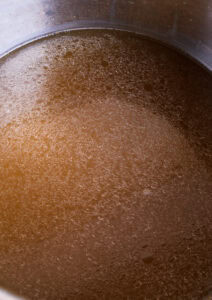
- Cut cooked dumplings in half and place in broth to warm.
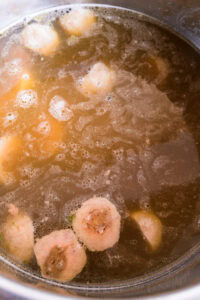
- Boil the rice noodles according to package instructions, but stop a little beforehand as they will still be cooking in the broth. Alternatively, cook for the same length of time directly in the broth, but make sure you can remove them easily.450 g rice noodles
To serve
- Place the noodles in the bottom of each bowl.
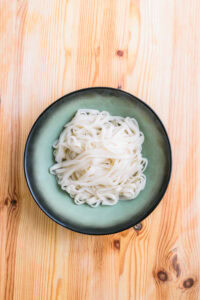
- Place a few slices of carpaccio raw steak, very thinly sliced500 g steak
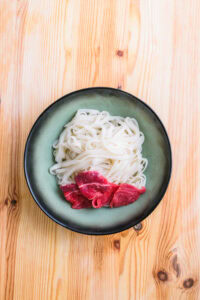
- Place a few slices of the reserved chunk of beef on top.
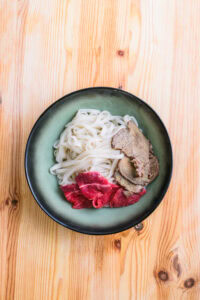
- Place a few pieces of dumpling
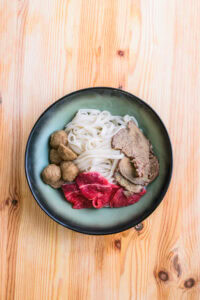
- Pour the boiling broth over it
- Add sriracha sauce, hoisin, coriander, bean sprouts, onion and Thai basil. You name it, we’ve got it.0.5 onion, 1 package mung bean sprouts, 1 package young onions, 1 package cilantro, Peppers, Lime, Sriracha sauce, Hoisin sauce, Mint, Thai basil
Notes
Nutrition
Culinary sources
If you’ve come across this recipe before, it’s based on a modified version from the blog “The woks of life”. I’ve since reworked the method, bringing it as close as possible to what is traditionally done in Vietnam. I used multiple sources, such as Chef Thuy Diem Pham’s, and hung out on a few Vietnamese forums (thanks to Google’s automatic page translation tool).
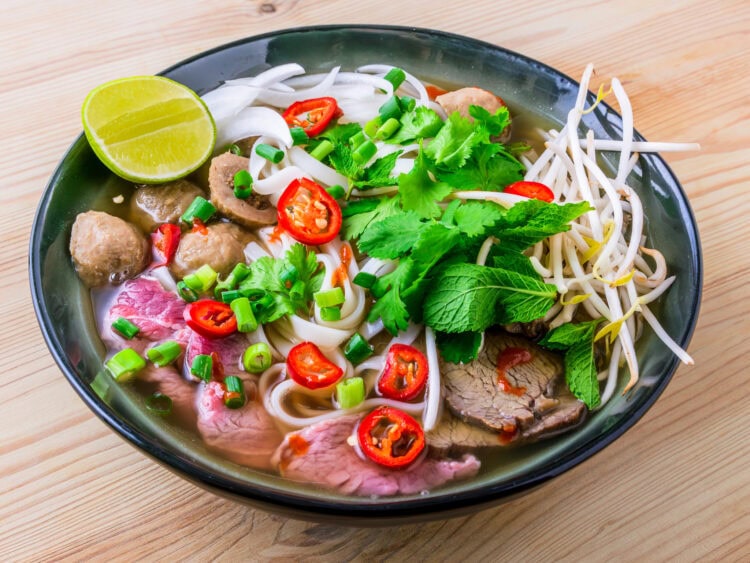


Such a gorgeous bowl when plated, with the herbs and bean sprouts making it look straight out of a food magazine; had to snap a quick photo before digging in 😋
Made this phở last night and it’s the ultimate comfort food, that fragrant broth plus the fresh herbs feels like a warm hug in a bowl. Perfect cozy vibes for a rainy day, everyone went back for seconds 😊
Je ne suis vraiment pas une pro en cuisine et je pensais que le bouillon allait être compliqué, mais en suivant tes étapes il est sorti super parfumé et clair, j’étais trop fière 😅
Super recette, le bouillon était incroyablement parfumé ! J’ai juste réduit le sel à 2 cuillères à soupe (avec la sauce poisson c’était déjà bien assaisonné) et le résultat était encore meilleur, bien équilibré. À refaire sans hésiter 🙂